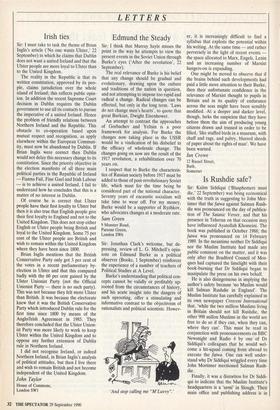Sir: Jonathan Clark's welcome, but de- pressing, review of L.
G. Mitchell's opin- ions on Edmund Burke as a political observer (Books, 1 September) reinforces the experience of a number of teachers of Political Studies at A Level.
Burke's understanding that political con- cepts cannot be validly or profitably up- rooted from the circumstances of history, and his acute insight into the dangers of such uprooting, offer a stimulating and informative contrast to the objectivism of rationalists and political scientists. Howev- 'And stop calling me "M'Luvvy".' er, it is increasingly difficult to find a syllabus that exploits the potential within his writing. At the same time — and rather perversely in the light of recent events — the space allocated to Marx, Engels, Lenin and an increasing number of Marxist hangers-on is expanding.
One might be moved to observe that if the brains behind such developments had paid a little more attention to their Burke, then their unfortunate confidence in the relevance of Marxist thought to pupils in Britain and in its quality of endurance across the seas might have been sensibly modified. At a deeper and darker level, though, lurks the suspicion that they have before them the aim of producing young citizens drawn and trussed in order to be filled, 'like stuffed birds in a museum, with chaff and rags, and paltry, blurred shreds of paper about the rights of man'. We have been warned.
Ian Crowe
12 Russel Street, Bath, Somerset


























































 Previous page
Previous page